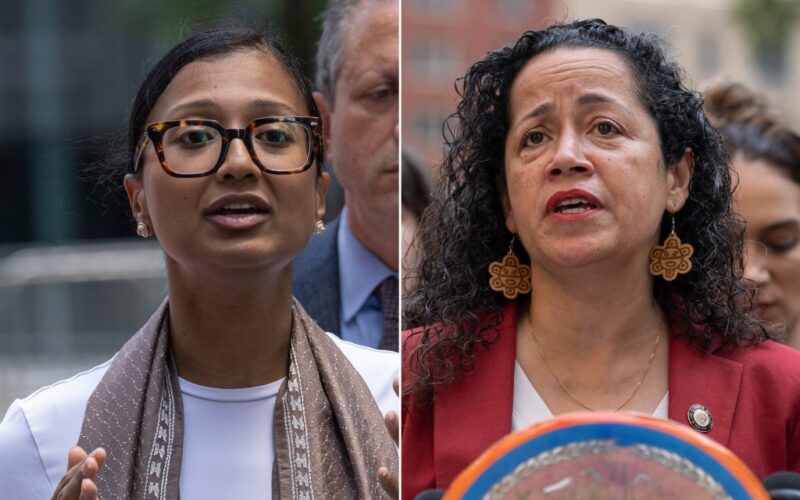The results of NYC’s Democratic primary have landed like a gut punch to those of us who have dedicated significant time and energy in opposition to Democratic Socialists of America (DSA) members on the City Council. Two of the most visible and ideologically rigid, Alexa Avilés and Shahana Hanif, cruised to victory in Brooklyn despite well-organized and well-financed efforts to oust them. As painful as it is obvious, we learned the hard way that the far left has built real infrastructure that we could not compete with.
In both races a clear mandate was delivered, despite each facing vocal opponents who challenged them on every failure and political miscalculation, from stances on antisemitism to their inattention to housing, public safety and child care.
Hanif’s reelection was particularly sobering. Maya Kornberg, her opponent, spent her career working on good government initiatives at NYU’s Brennan Center and has a fluency in public policy that reminded many of an early Brad Lander, who once represented this district. Kornberg had a professional campaign, knocked on doors, showed up at community events and forums, and made clear arguments against Hanif’s far-left framing of everything from international conflict to local policing.
Instead, the electorate opted for Hanif despite her refusal to acknowledge or engage dissenting perspectives. Concerns over antisemitic rhetoric and vandalism didn’t even tighten the race. Primary voters were more supportive of culture war vibes on national and international issues rather than competence or community responsiveness. Hanif’s campaign ignored all the nuance and instead offered an emotional mirror to a subset of the electorate who prefers performance over pragmatism.
Avilés’ victory was similar. Ling Ye, a Chinese immigrant, longtime Brooklyn resident and staffer to both Reps. Dan Goldman and Nydia Velázquez, seemed a promising bet to draw support from the area’s significant Asian-American population, which now makes up about a third of the district. Yet, turnout in that community was abysmal. Ye failed to gain traction even in the parts of Sunset Park that should have anchored her base.
In contrast, Avilés benefitted from the support of DSA comrades in the Council with large social media presence, like Chi Ossé, who used his platform to overcome Avilés’ lack of charisma. Combined with her longstanding ties to the DSA and unions, these loyalty networks resulted in impressive turnout operations. Avilés didn’t just win, she crushed it.
Driving much of this wave was, of course, the campaign of Zohran Mamdani. Positive and optimistic, his gamble paid off in dividends for the down-ballot races. Mamdani’s influence was instrumental in rallying DSA-aligned forces and injecting new energy into the broader progressive movement.
His framing of the race as a generational fight for affordability, rather than far-left ideological goals, resonated far beyond the DSA base. Through relentless person-to-person canvassing and simple grassroots messaging, Mamdani accelerated a political shift that drew in not just the usual left-wing coalition, but also Trump-supporting white ethnic populists and disaffected working class voters who simply felt everything was too expensive, and were desperate for someone to acknowledge it.
Mamdani was able to capture these voters, along with wealthy, secure New Yorkers who believed that a young, dynamic figure with lofty ideas and few details, was better than any of the establishment candidates. His coattails were very long.
For those of us working against them, this raises an uncomfortable question: Why did anti-DSA efforts fail?
While we have a lot of capital to invest in traditional campaigning, we have little organizational structure. While DSA organizers have spent more than a decade embedding themselves in neighborhoods, parent-teacher organizations, and tenant associations, we have not made the investments.
Where we court union leaders, they court members. Our campaigns are well-funded, but are mostly driven by opposition to bad policy and alienating rhetoric, rather than belief in change. We think our ideas are enough, they focus on the ground game.
This is not the end, however. It’s the beginning. The critiques of these councilmembers are legitimate. Many voters remain deeply concerned with rising antisemitism, public safety and a Council unwilling to confront complex realities with serious policy. But simply pointing those things out is not enough, it’s time to do the work.
The DSA did not rise merely by Tweet, TikTok or Reel. Like the far-right, they built and invested in a ground game, media ecosystem, relatable messaging, infrastructure and identity-based loyalty. If we ever hope to compete, we have to do the same.
Forman is the executive director of the New York Solidarity Network (NYSN), a membership organization committed to empowering New York’s Jewish community in state and local issues.







